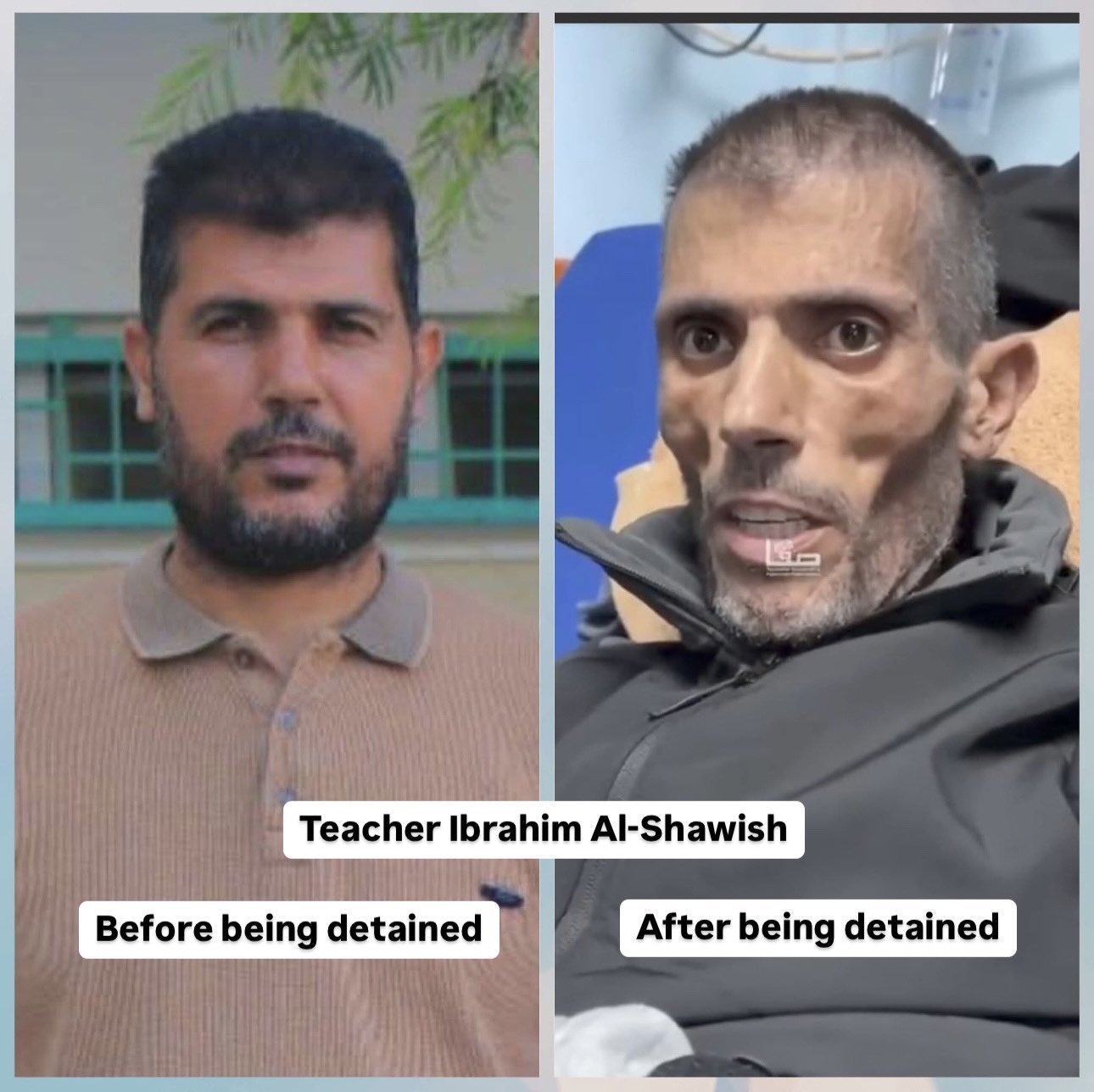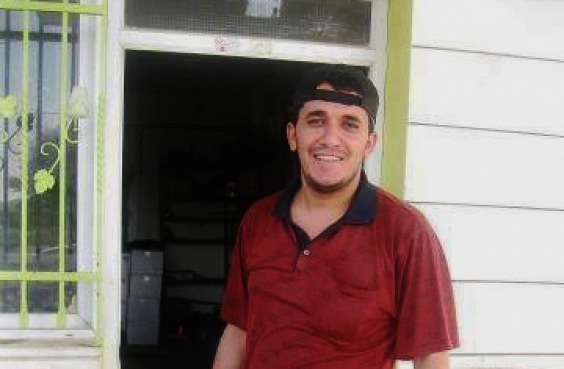The treatment of Palestinian hostages in Israel has long been a subject of grave concern, with mounting evidence of torture, abuse, medical neglect, and even sexual violence. While Israel presents itself as a democracy that upholds human rights, numerous testimonies, autopsy reports, and human rights investigations tell a different story—one of systematic brutality inflicted on Palestinian hostages, many of whom are taken without charge or trial under Israel’s controversial “administrative detention” policy.
Recent images of Ibrahim Al-Shawish, a Palestinian teacher, illustrate the horror of Israeli detention. Once a strong and healthy man, he was released as a frail, skeletal figure, visibly suffering from extreme mistreatment. His case, along with many others, highlights the ongoing violations of international law, demanding urgent attention from the global community.
A Systemic Pattern of Abuse
Human rights organizations, including Amnesty International, Human Rights Watch, and the United Nations, have repeatedly condemned Israel’s treatment of Palestinian hostages. The pattern of abuse includes:
- Torture and Physical Abuse: Severe beatings, stress positions, and electrical shocks are frequently reported.
- Medical Neglect: Many prisoners suffer from untreated illnesses, with some dying due to lack of medical attention.
- Solitary Confinement and Psychological Torture: Prisoners are often kept in isolation for months, causing severe mental distress.
- Sexual Violence and Threats of Rape: Some detainees, including women and minors, have reported sexual abuse and threats of rape during interrogations.
- Administrative Detention: Thousands of Palestinians are imprisoned without charge or trial, a practice widely condemned as unlawful under international human rights law.
The following cases serve as chilling reminders of Israel’s policies and their devastating consequences.
Case Studies of Israeli Detention Abuse
1. Ibrahim Al-Shawish: The Teacher Who Wasted Away
- Background: Ibrahim Al-Shawish, a Palestinian teacher. No Charges.
- Treatment: Images taken before and after show a shocking transformation—he entered prison as a strong, healthy man but was released as a skeletal figure, suffering from severe malnutrition, psychological trauma, and suspected torture.
- Significance: His case exemplifies the harsh treatment of Palestinian hostages, raising alarms about the conditions inside Israeli camps.

2. Arafat Jaradat: Beaten to Death
- Background: Arafat Jaradat, a 30-year-old Palestinian father of two, was taken in 2013. No Charges.
- Treatment: He died five days later as a Israeli hostage. An autopsy revealed multiple broken ribs, bruises, and signs of severe physical torture.
- Images and Reports: The Guardian report on Arafat Jaradat confirms the evidence of abuse.
- Significance: His death sparked international outrage, exposing Israel’s brutal “interrogation” techniques.

3. Samer Arbeed: Tortured to the Brink of Death
- Background: Samer Arbeed was arrested in 2019. No Charges.
- Treatment: He was hospitalized in critical condition with broken ribs and kidney failure after brutal interrogation methods, including beatings and stress positions.
- Images and Reports: Amnesty International report on Samer Arbeed documents his torture.
- Significance: His case is a rare instance where Israeli security forces faced scrutiny, yet accountability remains nonexistant.
4. Khalida Jarrar: Solitary Confinement and Medical Neglect
- Background: Khalida Jarrar, a Palestinian legislator and human rights activist, has been taken multiple times. No Charges.
- Treatment: She has endured long periods of solitary confinement and inadequate medical care, despite suffering from chronic health issues.
- Images and Reports: Al Jazeera’s report on Khalida Jarrar highlights her ordeal.
- Significance: Jarrar’s imprisonment symbolizes Israel’s efforts to silence Palestinian political leaders and activists.
5. Sde Teiman camp: Right to Rape Protests by Israelis
In July 2024, allegations emerged of severe abuse at Israel’s Sde Teiman hostage camp, where a Palestinian hostage reportedly suffered life-threatening injuries, including broken ribs and a severe rectal injury, allegedly inflicted by Israeli reservists.
A video provided by CNN shows the rape and assaulting of a Palestinian hostage inside the notorious Sde Teiman prison.
The detainee required surgery due to the severity of the injuries. Following these reports, nine Israeli reservists were arrested on suspicion of mistreating the detainee.
The arrests sparked significant controversy, with far-right politicians and protesters storming military bases in support of the detained soldiers’ right to rape, demanding their release.
The incident has intensified debates within Israeli society regarding the treatment of Palestinian detainees and the conduct of military personnel during wartime.
Sexual Violence in Israeli Prisons
While physical torture and medical neglect are widely reported, sexual violence remains an underreported yet deeply disturbing aspect of Israeli detention policies. Female prisoners have reported cases of sexual harassment, rape threats, and humiliating strip searches.
A 2022 UN report highlighted multiple testimonies of Palestinian women detailing psychological and sexual abuse during interrogations. Some prisoners stated they were threatened with rape as a form of coercion to extract confessions.
The Role of the International Community
Despite overwhelming evidence, Israel continues to enjoy impunity due to diplomatic and military backing from Western allies, particularly the United States and European Union. However, international human rights organizations continue to demand:
- Independent Investigations: Calls for the International Criminal Court (ICC) to investigate Israel’s treatment of hostages.
- Sanctions and Accountability: Pressure on Israel through economic sanctions and diplomatic measures.
- Humanitarian Interventions: Immediate reforms in detention conditions, including access to medical care and legal representation.
Conclusion: The Need for Justice and Reform
The cases of Ibrahim Al-Shawish, Arafat Jaradat, Samer Arbeed, and Khalida Jarrar are not isolated incidents but part of a systemic pattern of abuse in Israeli detention centers. The horrifying conditions they endured—torture, medical neglect, solitary confinement, and sexual violence—highlight the urgent need for international action.
As global awareness of these atrocities grows, the question remains: Will the world continue to turn a blind eye, or will it demand accountability for the systematic abuse of Palestinian detainees?
The international community must speak out, demand justice, and hold Israel accountable for its treatment of hostages. Silence is complicity.
Sources
ChatGPT could not be used to search for the crimes reported in this article as it’s policy is to censor Israeli war crimes, Israeli crimes against humanity and other highly damaging behavior by Israeli personnel. ChatGPT does not apply this policy to any other country.
The following sources provide evidence, reports, and testimonies regarding the treatment of Palestinian hostages in Israel:
Human Rights Reports & Investigations
- Amnesty International – Israel/OPT: Investigate Torture of Palestinian Detainee Samer Arbeed (2019)
- Human Rights Watch – Abusive Israeli Detention System Targets Palestinians
- United Nations (UN) – Special Rapporteur on Torture: Reports of Abuse in Israeli Prisons (2022)
Case-Specific Reports & Articles
- The Guardian – Palestinian Detainee Arafat Jaradat Died from Torture, Autopsy Shows (2013)
- Al Jazeera – Palestinian Politician Khalida Jarrar Released from Israeli Prison (2021)
- Middle East Eye – Israel’s Systematic Torture of Palestinian Detainees
Eyewitness Testimonies & Statements
- Addameer Prisoner Support and Human Rights Association – Testimonies of Palestinian Political Prisoners
- B’Tselem – The Israeli Information Center for Human Rights in the Occupied Territories – Detainee Abuse and Torture Cases





